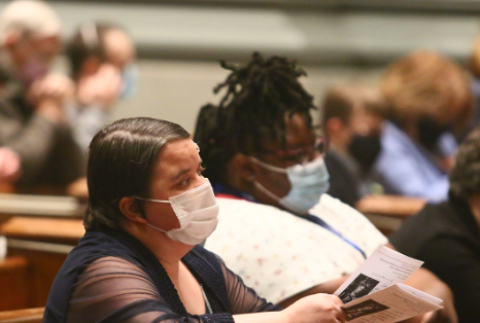
Rooted in philosophy proposed by Byung-Chul Han, “the art of lingering” refers to the value and attachment human beings place on vita activa or the doing of life. This hyperactivity and attachment to “doing” robs humans of the faculty of contemplation and authentic human encounter. When life regains this capacity, or this art of lingering, it gains in itself renewed vastness and duration.
In a 2016 address, Pope Francis noted the importance, gift, and value individuals with disabilities are to the Church, and the unique contribution each person adds to the global celebration of faith; yet, what is the present context of access and participation for individuals with disabilities and their families? My doctoral capstone research as an occupational therapist was centered around this very question. I explored access on a parish, diocesan, and national level. One component of this research included interviewing individuals with disabilities as well as parents of a child with a disability, in the Diocese of Joliet and the Archdiocese of Chicago, to record their lived experiences within the Catholic Church.
While many parishes satisfy ADA law requirements, I discovered that persons with disabilities and their families still did not always feel welcome or supported. Going beyond ADA requirements to make additional parish spaces accessible (e.g., adoration chapels, social areas, choir spaces), will help to create a worship space with reduced structural barriers to participation.
One parishioner suggested, “What if the Church employed individuals with permanent differences to represent the sacredness and value of human life? By explicitly hiring individuals with permanent differences as the face of human dignity, there is an implicit thundering of the value and sacredness of the lives of individuals with permanent differences.”
Leadership positions at parishes and (arch)dioceses often lack representation of persons with disabilities. Diversifying the face of leadership will help others to better recognize the fullness of the Body of Christ. This will best be accomplished by making formation and training accessible to persons with disabilities discerning leadership roles.
Parents of a Child with a Disability: Education, Belonging, & What Could Be
When interviewing parents of a child with a disability, three themes emerged:
- The importance of education for clergy & parish staff
“My parish priest told me that my son (with a diagnosis of autism) would ‘scare the bishop,’ and, therefore, my son could not make his confirmation.”
“I was asked to leave the children’s liturgy group after I was told my daughter (with a variety of cognitive and physical limitations) was ‘too loud.’ So, I decided to leave the parish.”
Foundational Church teachings about sacramental preparation and reception for persons with disabilities and an increase in training and resources provided for parish staff will promote a more unified, informed, and compassionate approach with parishioners.
- An increase in social support groups for both children and parents
Opportunities for socialization was a second theme noted. This was identified as a significant need for young adults who were aging out of the school system and lacked opportunities for community involvement. Parents of a child with a disability also vocalized this need. When parents in similar situations meet one another, natural connections are established which helps build bridges for much needed parent to parent support. This may lead to equally important sibling support networks being developed.
- A shift from inclusion to belonging
“The word ‘inclusion’ in itself can be hierarchical; it denotes a group that is included, and, therefore, a group that is not…one can be “included” in a group, but there is still a separation that exists between those that are innately ‘in’ and those that are only let in.”
Promoting a culture of belonging rather than inclusion reveals that persons with disabilities do not need to be ‘let in’ to the Church. To belong is to be a part of, to contribute to a whole in the same way and fashion as the other parts of that whole. To belong is to be at peace, to feel welcome, to be home.
A culture of belonging begins with one person; one person who welcomes another, who “lingers” for a while with another, who opens the door of his or her heart for a new connection in Christ. The narratives and lived experiences of individuals with disabilities and their caregivers within the Catholic Church signal the tangible steps parishes can take to promote a culture of lingering with another person. In this “art of lingering,” a restoration of journeying with the other occurs, and the cultivation and propagation of the ‘culture of belonging’ begins anew.
“For just as the body is one and has many members, and all the members of the body, though many, are one body, so it is with Christ. For in one Spirit we were all baptized into one body—Jews or Greeks, slaves or free—and all were made to drink of one Spirit” (1 Cor 12:12-13).
Written by Meghan Grill.
The content contained in this post and on this site are the opinions of the individual author and do not necessarily reflect the official policy or position of the National Catholic Partnership on Disability.
© The National Catholic Partnership on Disability 2022.
